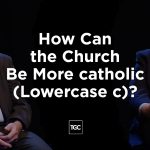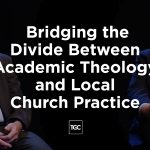Phillip E. Johnson died peacefully in his sleep on Saturday, November 2, at the age of 79 at his home in Berkeley, California. Phil will probably be remembered publicly as the author of Darwin on Trial (1991), or as the godfather of the intelligent design movement. That’s fair, but behind those accomplishments was a remarkable life, and at the center of that life was a remarkable conversion.
Phil became a Christian at age 38, and took the truth claims of the Christian religion seriously in a way that perhaps only an adult convert can. By that age, Phil had already been a law professor for more than a decade at the University of California, Berkeley. His path to the professorate was properly credentialed, from a Harvard AB to a University of Chicago JD. He clerked for Chief Justice Earl Warren of the U.S. Supreme Court, and wrote a widely used criminal law casebook for classroom use. As he told me once, he succeeded at everything he tried. In his early years he simply never met an intellectual challenge that could slow him down. Phil had a great brain, after all. By natural gifting he had those two traits that somebody has identified as the secret of Winston Churchill’s success: genius and plod. Phil could get a flash of insight, and he could dig in to do the work of following up on it. The combination is unstoppable.
But in his 30s, things fell apart. His marriage dissolved, and though his academic career was well established, it came to seem like nothing worth having. “I think my motives for going into it, for everything I did, were rather shallow. I was basically an academic careerist seeking tenure, writing law review articles and a casebook. I had the career, but I was bored with it.”
By natural gifting Phillip E. Johnson had those two traits that somebody has identified as the secret of Winston Churchill’s success: genius and plod.
In a 2002 interview, Phil described the strange crisis of his own success:
This, I think, is true of many people; what leads you to a conversion is the loss of your faith in something else. My faith had been, “If you’re a bright person with the right credentials, you’ll have a happy and meaningful life.” I expected that I would go from one distinguished position to the next, advance my career, be happy and satisfied, and that’s what life would be about. It seemed to me that wasn’t happening, and I was just going to be a law teacher for the rest of my life. It wasn’t very meaningful or as good as I thought it would be. So I lost faith during that pragmatic period. Instead, I thought, “What makes me think that what I have is better than the Christian life?”
He did a modern, academic, and intellectual version of 1 Thessalonians 1:9: he “turned to God from idols to serve the living and true God.” Phil became a Christian, joined the Presbyterian Church, met and married Kathie, and began for the first time in his life to look for something inherently meaningful to do with his great brain. He was finished with careerism and game playing.
Christian Thinker
Gradually he began to find his project. “One of the good things about the Christian life,” he said, “was that it opened up a whole world of intellectual input that previously had been closed to me. I began to understand what was actually wrong with the academic culture, and to put a name on my uneasiness.” He had always been a good legal thinker, but the juris doctor is neither a research degree nor a course of study especially designed to nurture the philosophical mind.
Now, with Christianity as a reference point, he saw that it was worthwhile to dig down deeper into the actual philosophy of law. He immersed himself in the Critical Legal Studies movement, which was a kind of postmodern theoretical project in the discourse of jurisprudence. Phil appreciated the critical edge of this movement, and recognized that some of its analytic tools and skeptical methodology were ideal for exposing the sham neutrality that the modern world had a vested interest in leaving unexamined. He jokingly referred to himself as “the entire right wing of the Critical Legal Studies movement.” Of course with his Christian commitments, his targets for deconstruction were different from the conventional targets of the movement.
Looking back on these first steps as a Christian thinker, Phil said, “I became acutely aware that what we think is reasoning is very often rationalization.” He was conscious of moving within a certain kind of postmodern theory, in the sense of finding a place to stand that called into question high modernism. But Phil’s use of postmodernism didn’t stop at cynical skepticism about the possibility of knowing reality. Quite the opposite:
When you speak of rationality, there are two very distinct components. One is logical reasoning, which is about going from premises to conclusions, conclusions that should be as good as your premises. Thus, logic will get you into insanity if you’ve got the wrong premises. The other component of rationality is having the right premises. How do you get them and how do you determine that they are right? Not by logical reasoning, surely, because then you would be reasoning from other premises in order to justify them. There is an instinct, or revelation, or whatever you want to call it, that underlies your thinking, and the only interesting problem in philosophy is how you get that.
Because of his conversion, Phil had gone from just working the academic system like a pro, to having strong opinions about what counted as “the only interesting problem in philosophy.” That was the decisive turn in his life, the moment of insight (there’s the genius) that he would spend the rest of his life following up on (there’s the plod):
My conversion was gradual, not dramatic. The central issue for me was whether Christianity was real or imaginary. I lived in a society at the university that mostly assumed an easygoing agnosticism. So I felt it was necessary to come to a conclusion on whether Christian metaphysics were real or imaginary, or if I would be throwing my brains out the window and adopting a myth because it satisfied my personal needs.
In a fairly quiet way, and at a high level of philosophical abstraction, in these first years after his conversion Phil made a series of judgments about the most important things in the intellectual framework of his era. None of these mental moves would’ve made Phil famous. But this is where the real revolution happened.
What followed was in some ways almost an accidental application of his decisions to a specific field. But it was a strategically important field.
Darwin on Trial
In 1987 Phil and Kathie spent a sabbatical in England, and Phil began indulging a side interest in evolutionary theory. He read Dawkins’s The Blind Watchmaker and was struck by how it seemed so invincible on one reading and so defenseless on another. Phil knew he was no scientist, and that the relevant evidence was outside his area of expertise. But his area of expertise included knowing how liars argue, and some of these books on evolution argued surprisingly like liars. “Something about the Darwinists’ rhetorical style made me think they had something to hide.” So he started a personal re-education project, reading everything he could get his hands on.
So Phillip Johnson’s conversion to Christianity, which started with his disillusionment about hollow success, worked its way through his intellectual apprehension of reality, and found its meaningful project: he would challenge the philosophical underpinnings of Darwinism and draw the metaphysical conclusions. “I wanted to know whether the fundamentals of the Christian worldview were fact or fantasy,” he said. “Darwinism is a logical place to begin because, if Darwinism is true, Christian metaphysics is fantasy.”
From there he emerged into the remarkable public role he would play for the next decade or so, from the 1991 publication of Darwin on Trial until a first stroke curtailed his academic activities somewhat in 2002. Phil tirelessly gathered friends and cobelligerents into his personal magnetic field of inquiry. His way of questioning Darwinism was unique, and it propagated among a diverse set of thinkers and activists. As participants recognized, it was a kind of phylogenesis, the appearance of a new form of vital intellectual life.
The broad, basic outlines of creation had to be established if Christian theology was to win any kind of hearing.
Phil fundamentally altered the conversation because of his natural broadmindedness and his talent for strategic thinking. He could see at a glance that all the lines were drawn in the wrong places. Creationists were wasting their time fighting each other over Bible interpretation, while a diversity of scientists and philosophers were maintaining an artificially united front despite deep internal disagreements. How could he unite the divided and divide the united? By asking The Right Questions (the title of his 2002 book).
One of the most useful questions Phil focused on was whether actual scientists needed to be committed to “methodological naturalism.” If that only means scientists don’t wait for miracles to happen in the lab, then sure. But if it means that every scientist must be committed to the proposition that methodological naturalism is appropriate because there is nothing beyond nature’s closed sequence of causes all the way back, then surely not. In fact, lab scientists are often pretty offended when informed by the popularizers of scientism that what they’re actually up to in the lab is an exercise in applied naturalistic philosophy.
Once this distinction drives its wedge into the modern mind, new cracks appear and people notice they’re on different teams than they first thought. Before long, the intelligent design movement coalesced around Phil because he had gotten to the bottom of things (“the only interesting problem in philosophy”). And he had gotten to the bottom of things because he had been given a new starting point for his life at the exact moment that his life had shown itself to be otherwise pointless.
Personal Encounter
I met Phil around 1996 when I moved to Berkeley to start a PhD in theology. Actually our wives met first, volunteering at a homeless meal, and their friendship drew our families together at First Presbyterian Church in Berkeley. I admired Phil right away, and enjoyed weekly Bible study breakfast meetings with the four of us. Phil showed real interest in my work on trinitarian theology, but he wanted me to understand that it would always sound imaginary to anybody who had already had their intellects formed by a prior decision against the metaphysics of Christian truth. He was right. The broad, basic outlines of creation had to be established if Christian theology was to win any kind of hearing.
The Johnson household was a non-stop engine of good works and big ideas.
Phil approached a question like Darwinism not in the squinty way that is all too common, but from an extremely wide, philosophical perspective. And he was such an exceptionally good writer that his books and essays will continue to find audiences.
Phil’s breadth of vision accounts for his key role in launching the Torrey Honors Institute at Biola University. It was Phil and Kathie who connected Torrey’s founder, John Mark Reynolds, with the funders and decision makers who would put into operation Reynolds’s visionary program of honors-level general education that starts with Homer and reads the greatest hits of Western civilization (including Darwin) in order to form the next generation of Christian leaders. And it was Phil and Kathie who sent me to join the program a few years later. Like a lot of people who came under his influence, my wife and I literally don’t know where we would be without Phil.
The Johnson household was a non-stop engine of good works and big ideas. In Torrey Honors, our students are sorted by houses, and one of ours is named the Johnson House, in Phil’s honor.
Happy Warrior, Resting Saint
One final reflection comes to mind on Phil’s life and character, here in the week of his death. At the height of his powers, Phil was unflappable and impossible to discourage. He simply blossomed under attack. He loved it. He genuinely gauged victories by the prestige and competence of his opponents. When his work was attacked in a book published by a university press, he only lamented that it wasn’t a better book from a better press. He was the “Happy Warrior” of the Wordsworth poem, “whom neither shape or danger can dismay.” As an adult convert, Phil had already counted the cost and knew what he was in for. But partly it was owing to his iron temperament.
After Phil’s first stroke in 2002, the most surprising thing to his friends was that in spite of a wonderful recovery, he somehow lost some of this imperviousness. He was suddenly capable of being discouraged. He was more tender in several ways. He noticed this about himself, and reflected on it.
Phil knew that his habitual source of power and self-confidence had been proven to be a fragile thing. He responded beautifully, with trust in God and a childlike confession that he was in God’s hands.
I think it all came back to his big brain. For most of his life, he had been confident that his big brain was more than adequate to meet any challenge. He was right! I routinely name Phil as the smartest man I’ve ever known, bar none. But a stroke brushes the brain itself, and even with a good recovery, Phil knew that his habitual source of power and self-confidence had been proven to be a fragile thing. He responded beautifully, with trust in God and a childlike confession that he was in God’s hands.
He had always been in God’s hands after all: even before he opened his eyes to Christ; during all the years when his big brain was capable of anything; in the years of retirement from active engagement; and now, at last, in final repose and eternal life.
Genius, and plod, and trust in God. Rest in peace, happy warrior.

































